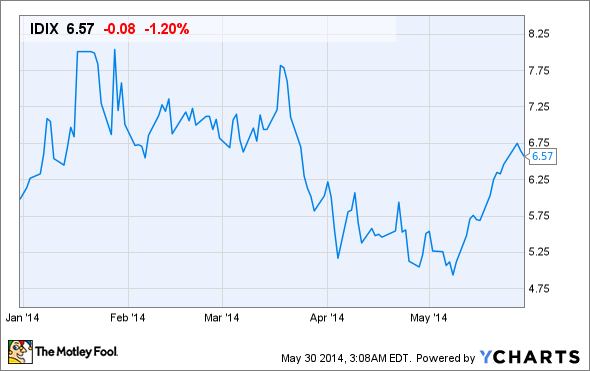After getting routed the last two years, short sellers finally had their day in biotech in the first-quarter of this year. Although many small-cap biotechs plunged by double-digits during this period, we are now starting to see signs that the worst may be over.
With that being said, short sellers have been steadily increasing their position in the clinical-stage biopharma Idenix Pharmaceuticals (NASDAQ: IDIX) since the start of the year. With short interest now around 16% of outstanding shares, I think it's important to consider three reasons why Wall Street is betting against this small-cap biopharma.
Reason No. 1
Idenix's platform for hepatitis C drugs is best known for its history of clinical holds and dead ends. Last April, we learned that Idenix decided to scrap the develop of IDX20963 after the company couldn't get the Food and Drug Administration to release its clinical hold on the drug. The FDA was reportedly asking for more preclinical data on the drug's safety profile.
What's key to understand is that this is a repeating pattern at Idenix, which doesn't bode well for the company's technological approach to hepatitis C drugs in general. In 2013, Idenix scrapped the development of IDX184 and IDX19368 over potential safety issues--both indicated as treatments for hepatitis C.
Reason No. 2
The hepatitis C market will be chocked full of all-oral, interferon free treatments by the time Idenix reaches a late-stage study. Presently, Idenix's lead clinical candidates for hepatitis C are only in mid-stage testing, namely IDX21437 and samatasvir. Gilead Sciences' (GILD +0.27%) Sovaldi sold over $2 billion last quarter, and Gilead is widely expected to gain FDA approval for an all-oral combo later this year. AbbVie (ABBV +0.01%) has also submitted its own all-oral combo for approval, which may come later this year, so we alreayd have two companies with big potential first mover advantages. Idenix will undoubtedly be facing a radically different market in 3 to 4 years, even if it's able to advance a clinical candidate into late-stage testing.
With other major players like Bristol-Myers Squibb and Merck & Co. also expected to gain FDA approvals in the next few years, Idenix looks to be the odd man out. Keeping with this idea, Johnson & Johnson's newly approved Olysio is even expected to see its sales slip going forward, as it will likely compete against a Sovaldi/Ledipasvir combo and AbbVie's triple-therapy soon. Put simply, it's hard to see where yet another hepatitis C drug fits into this crowded landscape of super drugs.
Reason No. 3
At the end of March, Idenix had $205 million in cash and cash equivalents. With a cash burn rate over the trailing-12 months of over $100 million, and only mid-stage (and earlier) candidates in its pipeline, it seems unlikely that management will be able to make the money last through to a potential drug commercialization. In other words, I think you should expect a capital raise and potential share dilution within the next two years and prior to any potential regulatory filing.
Foolish wrap-up
Despite the rising short interest in Idenix, shares have rallied this year, climbing higher by nearly 10% year to date. With that said, I think this rise in share price has been driven mostly by the excitement over Sovaldi's record breaking sales and a general sectorwide leg up over the past few weeks. When we dig deeper into Idenix's prospects moving forward, I don't see much to be enthusiastic about. The hepatitis C market is certain to change after the introduction of what amount to a handful of functional cures. So, if it's able to get a drug approved, Idenix's hopes for commercial success may hinge on their ability to compete price-wise, which translates to lower margins. Overall, you may want to exercise caution with this developmental biotech.








